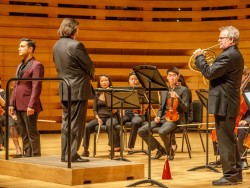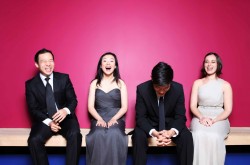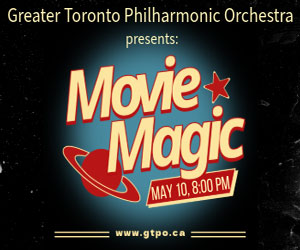Artistic Director Douglas McNabney’s farewell season of Toronto Summer Music (TSM), the “London Calling” edition, got off to a memorable start July 14 with a concert of English music for strings conducted by Joseph Swensen. McNabney introduced the evening and spoke to the large crowd in Koerner Hall of his programming raison d'être: celebrating the tradition of musical life in London over several centuries. He cited the huge repertoire to be unfurled in the more than three weeks through August 7 which would include European music reflected by the various concert-giving associations that provided 19th-century London music lovers with a rich diet of Continental fare. As well, he described the very pastoral, optimistic qualities of the English music that would bolster TSM’s ambitious schedule. He noted that Britten’s Serenade for Tenor, Horn and Strings, which we were about to hear, was the first piece he wanted to program in the festival.
The remarkable performance by American tenor Nicholas Phan, TSO principal horn Neil Deland and the TSM Festival Strings, was breathtaking in its execution; Deland’s horn playing unforgettable in its purity of tone, a wondrous support for the mercurial tenor and the assorted poetic anthology, the text taken from some of Britten’s favourite verse by the likes of Tennyson, Blake and Keats. The powerful Blow, Bugle Blow, the foreboding horn of The Sick Rose, the anguished and awestruck Lyke Wake Dirge and the seductive voice of To Sleep. What a rare treat!
The concert opened with Holst’s St. Paul’s Suite and the Jig which evoked the days of the British Empire with its quintessentially bright and optimistic spirit and delicate pastoral quality. Later, North African tone colouring contrasted with the British stiff upper lip before a familiar folk tune (with a subtle nod to Greensleeves) seemed to acknowledge imperial primacy.
After intermission, the outer movements of Tippett’s Concerto for Double String Orchestra concealed a lovely jewel, ahead of Elgar’s Introduction and Allegro in which the TSM Strings were joined by the formidable Parker String Quartet. Initial full-blown energy turned to a graceful execution of Elgar’s melodious introduction. There was wonderful interplay between the quartet and the strings; an impressive sonic richness and typical Elgarian tunefulness filled the sweeping phrases as the Parker Quartet played with compelling intensity.
The following day, July 15, the quartet took centre stage at Walter Hall in a nod to The Musical Union of 1865, a classical chamber music association “disseminating a taste for good music amongst the upper classes in London.” Led by the forceful first violinist Daniel Chong, the Parker Quartet produced a dynamic, cohesive full sound; their balanced ensemble playing conveyed all of Haydn’s sophistication in his String Quartet Op.71 No.2 (1793), the 55th iteration of the form he invented. All voices were heard and paid attention to in the resplendent Adagio.
In Beethoven’s String Quartet Op.18, No.2 (1799), his second (written less than a year after the Sonata Pathétique for piano), the Parker showed great togetherness and sense of purpose as they swirled through the composer’s complex development. They brought a Haydnesque playfulness to the Scherzo with its theses and antitheses and in the final Allegro, intimations of the great creative spirit that would flower as Beethoven matured.
There was a hushed tension, a kind of magical effect, as they began their magisterial performance of Schubert’s String Quartet No.15, D887 (1826), his final quartet. The first movement was driven and overflowing with melodic moments, with Chong parrying and thrusting like a master musical swordsman, balanced by the empathetic cello playing of Kee-Hyun Kim. The charming trio of the third movement was suffused in songful melody while the final Allegro assai was replete with contrasts, style and verve.





